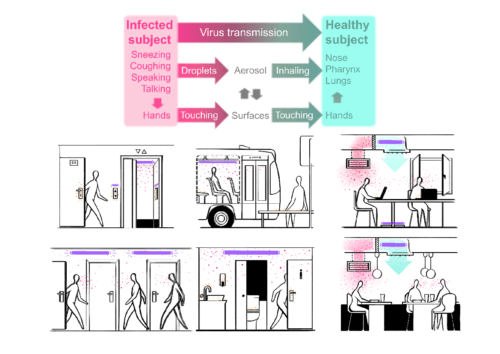The concept published in the journal ACS Nano is based on killing the virus using ultraviolet radiation

An international group of researchers from Israel, Spain and Great Britain presents an old-new solution for breaking the cycle of corona infection: disinfection using ultraviolet radiation. The researchers - experts in virology, immunology, aerosols, architecture and physics - published the concept in the journal ACS Nano. Dr. Ado Kaminer from the Viterbi Faculty of Electrical Engineering at the Technion is a member of the research group.
The COVID-19 epidemic, which spread rapidly from the Wuhan province of China to about 190 countries and has so far claimed the lives of about 460 thousand people worldwide, has led to the adoption of various and varied preventive measures. Many countries managed to curb the epidemic by suspending international flights and public transport and closing public sites including schools and universities, restaurants and cafes, sports clubs and workplaces.
The said preventive measures did help in curbing the epidemic, but incurred a significant social and economic cost. Therefore, the governments of the "corona countries" are trying to return life to normal while adhering to basic rules such as physical distancing, frequent hand washing and the use of masks. However, it is clear that the physical proximity used in spaces such as buses and offices, restaurants and gyms, concert halls and classrooms makes it difficult to maintain these rules. That is why there is an "arms race" for tools to disinfect those vital environments.
Infection with the SARS-CoV-2 virus occurs mainly in one of two ways: "interpersonal" infection through small droplets of body fluids floating in the air; and infection through contaminated surfaces, i.e. surfaces that patients have touched or left droplets of saliva on. The infection through surfaces is particularly significant in closed spaces, therefore disinfecting surfaces and disinfecting the air in such spaces has become a significant goal in the fight against Corona. Disinfectants have been found to be effective in this context, but they are expensive, require a lot of work and have negative consequences for human health.
Now, after examining a variety of options, the international research group suggests using ultraviolet radiation to reduce SARS-CoV-2 infection. The concept of killing bacteria and viruses using ultraviolet radiation won the Danish researcher Niels Finsen the Nobel Prize in Medicine as early as 1903, for the treatment of skin tuberculosis (lupus vulgaris). Similarly, the researchers suggest using a certain spectrum of UV-C - ultraviolet radiation known for its ability to kill bacteria and viruses - to disinfect objects and surfaces such as elevator buttons and door handles and even to disinfect the air in the ventilation systems in buildings. Today this radiation is used in operating room disinfection, food packaging disinfection and water purification facilities, and lamps that emit it are an available and cheap product. According to the researchers, the application of UV-C radiation in killing the SARS-CoV-2 virus is a quick, flexible and cheap solution for disinfecting millions of work spaces, including offices, schools, health facilities and means of transportation. Furthermore, this solution, which is intended to provide an immediate response to the challenges of the Corona virus, may be useful in the future as a standard sterilization infrastructure in public buildings, public transportation systems, etc.
Dr. Ado Kaminer from the Viterbi Faculty of Electrical Engineering at the Technion and his colleagues at the following institutions participated in the study: ICFO - The Institute of Photonic Sciences, University of the Basque Country, University of the Basque Country, Rovira i Virgili University and the University of Southampton
More of the topic in Hayadan:

One response
Is it they who told Trump to irradiate the patients from Japan?